- Home
- John Kendrick Bangs
Cattle-Ranch to College Page 4
Cattle-Ranch to College Read online
Page 4
CHAPTER II.
THE YOUNG BRAVE'S DARING.
While the men were eating (a sufficient number being left to keep watchand guard) in one of the dance halls, which was hastily impressed forthe purpose, the herders of the N bar N outfit were questioned as totheir knowledge of the Indians.
They reported that the redskins were in force and were coming rapidly inthe direction of the town. That while they were guarding their stock,they were startled by the sudden appearance of an Indian near them, whoyelled and waved his blanket, and finally succeeded in stampeding theanimals. They started off at a gallop after the horses, and thissolitary brave forthwith disappeared.
The stock stampeded but the herders stayed with them, riding full speedover all sorts of rough country. The Indians appeared at intervals inpursuit of them, and added to the confusion and danger by keeping up arunning fire.
The herders said they were about to give up the attempt to keep theircharges out of the savages' hands when they came in sight of the town."Even then," said one of the men, called Singing Jim, "we couldn't havecorralled the beasts if that youngster hadn't chased out to help us on afresh horse, and a fast one at that."
"We'll have troubles yet," said the other herder, Calamity Jake he wascalled, because of his ability to see small black clouds of evil a greatdistance off. "Plenty of trouble, too, in the shape of Indians on thewarpath. They were not far behind us when we reached these diggin's."
"What became of your wagons?" said Harry Hodson, a mouthful of beansinterfering somewhat with his speech.
"Oh, I guess they're done for. Probably makin' light for the Indians todo a war dance by," remarked Singing Jim, cheerfully.
"I reckon not," said Mackenzie, who had appeared in time to hear thelast; "they'll not show their location by making a big blaze like--"
"I heard a shot fired from over the hill," shouted Johnny, who stuck hishead in at the door that moment. "Maybe it's one of the pickets."
The men jumped up and made a rush for the door. The herder, SingingJim, who was the last man out, exclaimed as he disappeared, "Well, ifthat kid ain't ubikkertous, as the States' papers say!"
Several shots were now heard and then the pickets topped the rise andmade a break down the slope to the town.
The enemy was close, but still invisible behind the ridge.
The men lay crouched behind their barricade, silent, alert, ready forwhat might come. The three pickets made their way back to thebreastworks and reported that the advance guard had shown itself comingdown a _coulie_ half a mile away, and the main body, probably fiftystrong, was straggling after when the pickets last looked back. A longnight of vigil and hurried preparation had told on these watchers andthey were anxious to begin the work and end the suspense. The short tenminutes which elapsed seemed ten hours. Then two Indians rode to the topof the ridge and looked down upon the preparations for their reception.They were a long rifle shot distant and the defenders had no ammunitionto spare. Moreover, if unprovoked, the redskins might go without firinga shot. To tell the truth, however, especially when they saw theunlikelihood of making a successful assault, most of the littlegarrison were in the mood to feel disappointed if the attack ended soharmlessly.
"If those fellows are hard up for a fight," said Big Bill Smith, "maybethey'll tackle us; but I never saw an Indian yet that would ride aquarter of a mile in the open under fire even when he wanted somethingto eat,"--and Bill knew Indians.
"They won't leave without tryin' us," said Casino. "You'll see if Iain't right."
A moment later two painted and befeathered savages appeared to the left,and rode full tilt along the hillside in direct view of the camp,yelling and waving their blankets in derision: a tantalizing sight tothe waiting men.
"Keep steady, there," called Mackenzie, sternly, as several rifles wereraised. "There's no use shooting now; they're only trying to draw ourfire and find out how strong we are. There'll be more presently. Waitfor them."
A few minutes later half a dozen braves repeated the ruse. The flyingfigures, almost naked, being poor targets, the fire of the littlegarrison was still reserved. A dozen then made the run, one followingthe other, at regular intervals. More and more of the painted, yelling,gesticulating savages followed, dashing along the slope in single fileand disappearing over the ridge to the right, until what was a shortline became a procession.
Presently they began to creep down the hill, each rider advancing beyondthe one preceding him, all yelling epithets of contempt as they cameever nearer the silent garrison.
This was the regular mode of Indian attack; it afforded them anopportunity to fire and yet gave their enemy a very poor chance to doany damage.
A desultory firing began; each Indian letting go his reins, fired hisrifle as best he could as he rushed past. The shooting was naturallybad, for there was no chance to take careful aim. If the savagesplanned, however, to draw the fire of the besieged and so determinetheir strength, the scheme failed, for not a shot was fired from thecamp, though the provocation was great.
The rushing line came closer and closer. The colors of the war paint andfluttering feathers could now be plainly seen. It was within easy range,but still the fire was withheld. Each Indian had worked himself into thefrenzy which is so necessary a part of a brave's courage.
As the distance was lessened, the savages' aim became better, andseveral bullets struck the wagons and the barricade. The situation beganto be interesting; any shot might now reach its human target, and thetemptation to return the fire was almost irresistible.
But the sheriff only said, "Not yet."
The bullets were striking freely and the yelling enemy were within easyrevolver range.
At last Mackenzie, who showed signs of suppressed eagerness, said, justloud enough to be heard: "Boys, don't shoot when your man is opposite;wait till he has passed, then aim at his back and shoot straight. Youcan't hit him otherwise. Ready now. Fire!"
This was not a military company, but a band of frontiersmen, which acommon danger united under the leadership of one man. The volley whichfollowed, therefore, was not one of precision, for every man took histime and pulled the trigger when he was ready.
The Indians, anticipating a return fire, rode by at full speed, theirbodies hugging their horses closely. They made difficult targets, so thefirst few shots did nothing more than kill and disable a horse or two;but soon the fire became more rapid and accurate. A big buck was seen tofall out of his saddle, another was thrown violently from a woundedhorse, several were hit in arms and legs. The yelling diminished and theline moved further up the slope, scattering as it went.
As the file, now rather scattered, turned the ridge at the right,firing as it moved, a young buck, in full war regalia and mounted on abeautiful bay pony, bounded into view. He dashed out of the circle ofIndians, and rode boldly down toward the white men, yelling defiance.
He was a young chief endeavoring to earn the approval of his tribe andthe consequent advancement and influence, according to the custom of theSioux. Down the hill he came with a rush right into the thick of thefire, and yet, though the bullets whistled on all sides of him, he wasunharmed. Nearer and nearer he drew, until he reached a point within twohundred yards of the white man's guns. Then he stopped, turned his ponyhalf-way round and flourished his revolver derisively, yellingimprecations at the garrison the while. He then fired a shot which cameso close to John, that he was sure he could feel the wind of it--thesound was unmistakable.
After this reckless feat, the young chief trotted slowly back to his ownpeople, but kept his face always towards his enemies. The daring of thedeed took both sides by surprise, and for a time hardly a shot was firedby white man or red. It was a tribute to the young brave's courage andbravado.
It would not do, however, to let him escape unharmed. Other warriorsmight be inspired to emulate the rash act, and if they took it intotheir heads to rush the stockade there would certainly be much loss oflife.
The Indians now began firing again, coverin
g as well as possible theircomrade's retreat. Those behind the barricade also woke up.
"Shoot that fellow, boys," cried Big Bill. "He mustn't get away unhurt.We've got to discourage that sort of thing."
Every man aimed at the fleeing Indian, but still he rode with his facetowards his foe, gesturing defiance. The feathers in his war-bonnetfluttered in the wind, and the quirt hung on his upraised right wristswayed with the motion of his pony.
Of a sudden a single rifle spoke from the white man's intrenchments,and, in an instant, the young chief was changed from a superb livingbronze statue to a lump. He fell, clawing at his saddle and yellingshrilly. His well-trained war pony slowed down and circled back to wherehis master lay.
All this occupied much less time than it takes to tell it.
During this distraction, half a dozen Indians, who had been unhorsed,rose from their brush coverts and ran for their lives to gain the moresubstantial refuge which the ridge afforded. Four escaped, but two weredropped in their tracks before they could reach the shelter.
Though bullets had dropped all around the white men, none had been hit.
"Had enough?" said the sheriff. "Found the camp stronger than youthought, eh?"
Such seemed to be the case, for, after a long parley, which was helddiscreetly out of range, the band disappeared, leaving their dead on theprairie.
An attempt had been made to rescue the fallen, but the risk was toogreat, and it was given up.
The Indians had been gone some time before the little garrison creptcarefully from under cover, for the Sioux were notoriously tricky andtheir apparent departure might simply be a ruse to put their enemies offtheir guard.
Finally, however, the sheriff turned to his men. "Casino," said he,"you, Singing Jim, and Calamity Jake follow their trail and see whatbecomes of them. If they start to come back you hump yourselves and letus know. You'd better go along, Hodson, and look after your stock."
The men appointed saddled up and started out without delay. The goodwishes of those remaining went with them. It was a perilousundertaking, for there was no telling where the war party might be orwhat they might do.
After the scouts had left, guards were set to keep watch and prevent asurprise, though it was thought that there was little danger of anattack by daylight.
The sheriff and the rest of the men began to count noses, not only ofmen but of stock, for it might be that in the excitement some one orsome animal had been hit unknown to the others. In fact, it would be amarvel if one bullet had not reached its mark, since, at times, they haddropped around like hail.
All were found intact, but several of the wagons had been pretty badlyriddled.
A barrel of molasses which rested in one of the wagons was punctured bya 45-calibre bullet, and the sticky stuff leaked down on and in a trunkmarked "Charles R. Green, Boston."
"Belongs to a tenderfoot who got stalled with the rest of his outfitnear the railroad," Casino had explained, when some one remarked on thestrange object.
Certainly the "tenderfoot" was having rather a novel introduction to thehardships of frontier life. As Charley Green said afterwards, "he wasstuck on himself for fair."
Mr. Worth and John now thought of the family at the Sebells', and atthe first lull they made their way back between wagons, around andthrough bunches of cattle, mules, and horses to the house. It was hardto tell which was most glad to see the other, but a stranger coming inwould not have realized that this was the return of a father and sonafter several hours' exposure to all the perils of Indian warfare. Therewere no tears of joy, no outward demonstration of happiness. Thefrontiersman had learned, perhaps from the Indian, perhaps from sternnature herself, to keep his feelings to himself. Even John and Ben werenot demonstrative.
"I suppose you did 'em up?" said the latter to his more fortunatebrother. "How many were there in the party?"
John dropped to the floor, for the experience of the night before was,at least, trying. "Sure we did," he answered. "They didn't come tilldaylight and so were in plain sight, while we were under cover, see?Same bunch we saw the other day, I guess. Phew! I'm tired."
He had hardly got the words out of his mouth before he was sound asleep,and, not long after, his father was also in the land where none butphantom enemies are seen.
The Indians evidently had enough, for they disappeared, taking withthem, however, some of the N bar N stock. The two herders accepted thesituation, each in his own fashion.
"I told you so," groaned Calamity Jake. "These pesky Indians ought to bewiped off the face of the earth."
Singing Jim, however, merely grinned, and said as he ran his fingersthrough his hair: "Well, I'm glad this thatch is not decorating someSioux tepee. I think it looks better on me than it would on a lodgepole."
After this, things went on in much the same old way in the littlefrontier town, for the Indians did not venture another attack.
In spite of its small size, Bismarck was a busy place and was thedistributing point for a large unsettled territory.
Freighters came in from points on the distant railroad with provisionsfor the cattlemen, trappers, and miners, and the constantly changingpopulation of the town. Their wagons were in long trains, one hitched tothe other, the whole drawn by many teams of mules and driven by one man,who rode the near mule next the first wagon, controlling his team by asingle "jerk line," which ran to the front near animal. This mule, whowas picked for his intelligence, knew that one pull on the line meantturn left, and two short jerks indicated that a right turn was wanted;moreover, he knew just how wide a sweep to make to clear an obstruction.
When the trapper came to town to bring in his pelts for shipment East,and to get a supply of pork, beans, and coffee---his standbys in thematter of diet---and when the cowboy raced in with a couple of packponies to get supplies for his outfit, the rare opportunity was alwaystaken advantage of to enjoy what pleasures the town afforded. Thegamblers and saloon keepers did a thriving business, though a perilousone, for, on the slightest provocation, the frontiersman was ever readywith his shooting irons.
It was only a few weeks after the Indian attack described before theparching heat of summer began to give way before the dreaded wintrybreath of the North.
John and Ben, when they went out to guard their father's stock, gave uptheir daily swimming in the river and took up horse racing instead; andmany a race was hotly contested. The boy, however, who rode Baldy, thebig bay, always won.
Mr. Worth, as has been noted before, was a freighter; he was also aminer, opening up mines of coal in the deep-cut river banks, the coal soobtained being sold to the government for the fort garrisons.
GLANCING OVER SAW AN INDIAN VILLAGE. (_Page 37._)]
On these coal-prospecting trips he usually went alone, carrying on hisback the bare necessaries of life: a blanket, perhaps a string of bacon,a bag of beans, and a little coffee, besides the never-absent rifle andrevolver.
Late in the fall, Mr. Worth set out on a prospecting trip. The garrisonsof Fort Lincoln and other outposts situated up the river were clamoringfor more fuel, and no time must be lost if they were to be suppliedbefore the heavy snows set in.
John went with his father a half day's journey, helping to carry hisequipment. They started out afoot, and the mother, holding the baby inher arms, watched them.
"So long," called back Mr. Worth, as he started out.
"So long," returned his wife.
At dark, John returned and, in his self-sufficient way, began to preparefor the night. He and Ben each saddled a horse, of which there wereseveral tied to a pole, and set out to round up the "saddle band" (asthe ponies which were reserved for riding were called), and the workstock of mules and pack horses. They were not far off, nibbling thetufted buffalo grass, and soon were turned toward the corral, the boysriding on either side, ready to head off any animal that showed adisposition to separate or lead the "bunch" astray.
The stock safely disposed of, John and Ben went back to the shack, butwere promptly sent out
again for wood and water.
"Let's get a lot of wood," said Ben, "for it's colder than blazes. Hopethe governor will find a good place to turn in to-night."
"Oh, he's all right," replied John, between grunts, for the load of woodhe was carrying was both heavy and bulky.
An hour or so later, the windows and door were barred, the embers of thefire scattered, and all hands turned in for the night. The beds werereally bunks built into the wall, and were not exactly luxurious, springmattresses being quite unknown; but the boys found them comfortable, andin a minute or two were rolled in their blankets like great cocoons andfast asleep.
* * * * *
Mr. Worth was not expected back for several weeks, for his journey wasto be a long one and subject to many delays on account of bad weatherand, worse, Indians.
It was about a week after he had left that Charley Green came up towhere the boys sat on the door-step braiding whips or quirts.
"Hullo, kids," he said, "Mr. Mackenzie wants--what are you doing?" Hiscuriosity made him forget his errand.
"Braidin' a rope to hang a couple of horse thieves," said John,facetiously. "What did you think we were doing, branding calves?"
Even the kids made fun of the "tenderfoot," who was really a goodfellow, just out from an Eastern college, but densely ignorant as far asWestern ways went. He saw he was being laughed at, and so hastened tocome back to his errand.
"Mr. Mackenzie wants some old clothes, blankets, and other warm thingsfor a man who turned up just now, half-dressed. He's almost frozen.White man, too," he added.
In a few minutes John and Tenderfoot Green reached the sheriff's shack,bearing clothes and blankets. The crowd that stood before the doorparted and allowed them to pass.
In the far corner of the room, leaning over the fire, sat a man whoturned his head as John and Green came in.
"Why, it's my father!" cried John.

 The Genial Idiot: His Views and Reviews
The Genial Idiot: His Views and Reviews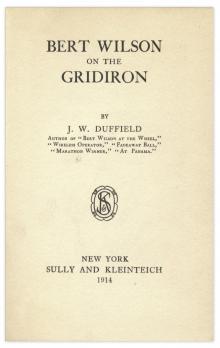 Bert Wilson, Marathon Winner
Bert Wilson, Marathon Winner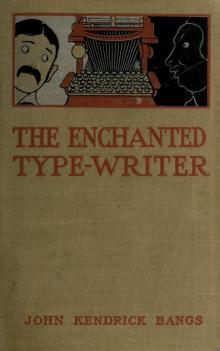 The Enchanted Typewriter
The Enchanted Typewriter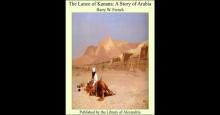 The Lance of Kanana: A Story of Arabia
The Lance of Kanana: A Story of Arabia Coffee and Repartee
Coffee and Repartee The Idiot at Home
The Idiot at Home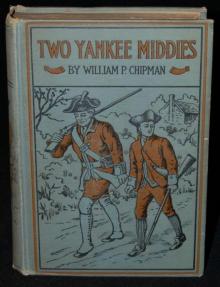 Budd Boyd's Triumph; or, The Boy-Firm of Fox Island
Budd Boyd's Triumph; or, The Boy-Firm of Fox Island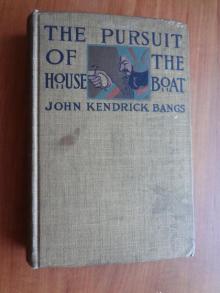 The Pursuit of the House-Boat
The Pursuit of the House-Boat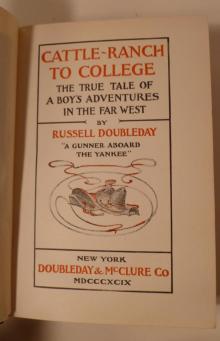 Cattle-Ranch to College
Cattle-Ranch to College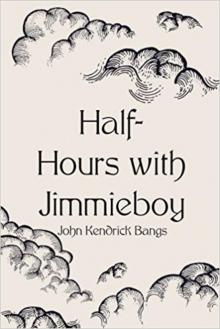 Half-Hours with Jimmieboy
Half-Hours with Jimmieboy Bikey the Skicycle and Other Tales of Jimmieboy
Bikey the Skicycle and Other Tales of Jimmieboy Toppleton's Client; Or, A Spirit in Exile
Toppleton's Client; Or, A Spirit in Exile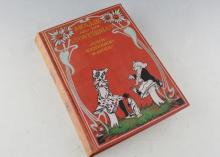 Mollie and the Unwiseman
Mollie and the Unwiseman The Inventions of the Idiot
The Inventions of the Idiot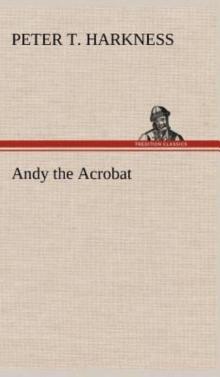 Andy the Acrobat
Andy the Acrobat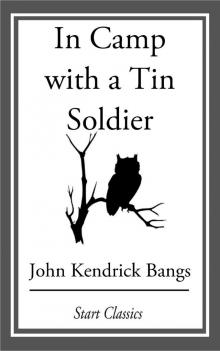 In Camp With A Tin Soldier
In Camp With A Tin Soldier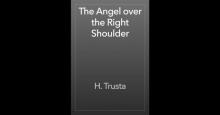 Angel over the Right Shoulder
Angel over the Right Shoulder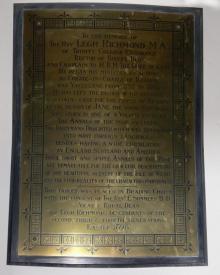 Annals of the Poor
Annals of the Poor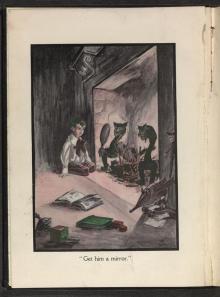 Andiron Tales
Andiron Tales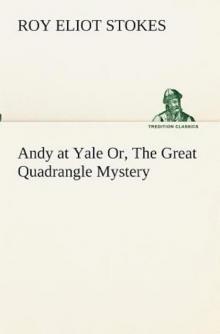 Andy at Yale
Andy at Yale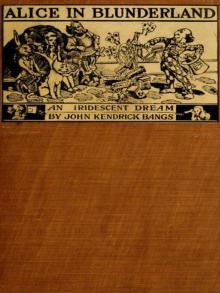 Alice In Blunderland
Alice In Blunderland